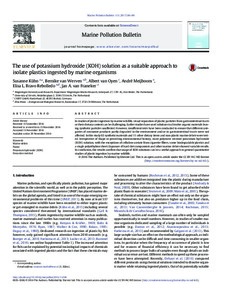| dc.contributor.author | Kühn, Susanne | |
| dc.contributor.author | van Werven, Bernike | |
| dc.contributor.author | van Oyenc, Albert | |
| dc.contributor.author | Meijboom, André | |
| dc.contributor.author | Bravo Rebolledo, Elisa L. | |
| dc.contributor.author | van Franeker, Jan A. | |
| dc.date.accessioned | 2020-04-29T18:11:51Z | |
| dc.date.available | 2020-04-29T18:11:51Z | |
| dc.date.issued | 2017 | |
| dc.identifier.citation | Kühn, S.; van Werven, B.; van Oyenc, A.; Meijboom, A.; Bravo Rebolledo, E.L. and van Franeker, J.A. (2017) The use of potassium hydroxide (KOH) solution as a suitable approach to
isolate plastics ingested by marine organisms. Marine Pollution Bulletin, 115, pp.86-90. DOI: http://dx.doi.org/10.1016/j.marpolbul.2016.11.034 | en_US |
| dc.identifier.uri | http://hdl.handle.net/11329/1311 | |
| dc.identifier.uri | http://dx.doi.org/10.25607/OBP-819 | |
| dc.description.abstract | In studies of plastic ingestion by marine wildlife, visual separation of plastic particles from gastrointestinal tracts
or their dietary content can be challenging. Earlier studies have used solutions to dissolve organic materials leaving
synthetic particles unaffected. However, insufficient tests have been conducted to ensure that different categories
of consumer products partly degraded in the environment and/or in gastrointestinal tracts were not
affected. In this study 63 synthetic materials and 11 other dietary items and non-plastic marine debris were tested.
Irrespective of shape or preceding environmental history, most polymers resisted potassium hydroxide
(KOH) solution, with the exceptions of cellulose acetate from cigarette filters, some biodegradable plastics and
a single polyethylene sheet. Exposure of hard diet components and other marine debris showed variable results.
In conclusion, the results confirm that usage of KOH solutions can be a useful approach in general quantitative
studies of plastic ingestion by marine wildlife. | en_US |
| dc.language.iso | en | en_US |
| dc.rights | Attribution-NonCommercial-NoDerivatives 4.0 International | * |
| dc.rights.uri | http://creativecommons.org/licenses/by-nc-nd/4.0/ | * |
| dc.subject.other | Marine debris | en_US |
| dc.subject.other | Microplastics | en_US |
| dc.subject.other | Plastic litter | en_US |
| dc.subject.other | Plastic debris | en_US |
| dc.subject.other | Extraction method | en_US |
| dc.subject.other | Potassium hydroxide (KOH) | en_US |
| dc.title | The use of potassium hydroxide (KOH) solution as a suitable approach to isolate plastics ingested by marine organisms. | en_US |
| dc.type | Journal Contribution | en_US |
| dc.description.refereed | Refereed | en_US |
| dc.format.pagerange | pp.86-90 | en_US |
| dc.identifier.doi | http://dx.doi.org/10.1016/j.marpolbul.2016.11.034 | |
| dc.subject.parameterDiscipline | Parameter Discipline::Environment::Anthropogenic contamination | en_US |
| dc.subject.parameterDiscipline | Parameter Discipline::Environment::Human activity | en_US |
| dc.bibliographicCitation.title | Marine Pollution Bulletin | en_US |
| dc.bibliographicCitation.volume | 115 | en_US |
| dc.description.sdg | 14.1 | en_US |
| dc.description.maturitylevel | TRL 9 Actual system "mission proven" through successful mission operations (ground or space) | en_US |
| dc.description.bptype | Manual (incl. handbook, guide, cookbook etc) | en_US |
| obps.contact.contactemail | susanne.kuehn@wur.nl | |
 Repository of community practices in Ocean Research, Applications and Data/Information Management
Repository of community practices in Ocean Research, Applications and Data/Information Management

